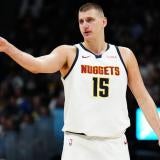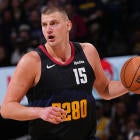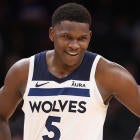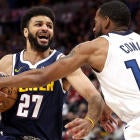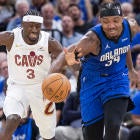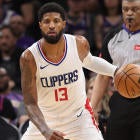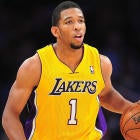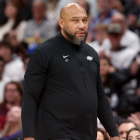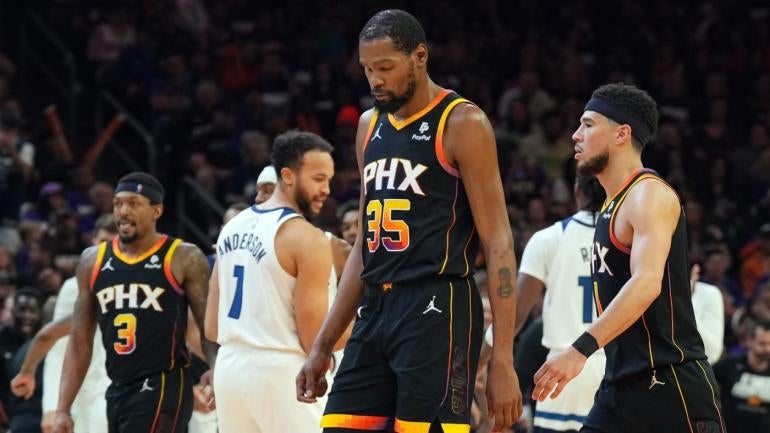
The Phoenix Suns are on the verge of being swept out of the first round by the Minnesota Timberwolves, whose suffocating blend of perimeter pressure and rim protection is making Kevin Durant's life miserable. Durant finished Game 3 just 8-for-18 from the field. He's missed 19 of his last 33 shots in this series. For Durant, this damn near constitutes a crisis.
The Suns, who move about as much as cement and aim to survive on just about the unhealthiest shot diet known to man, don't make it any easier on him. But this is a brand of basketball Durant prefers to play. And it's not working.
Unless the Suns become the first team in history to recover from a 3-0 deficit to win a best-of-seven series, Durant will move to 2-4 in six playoff series since leaving the Golden State Warriors in 2019 -- point at which he began trying to superteam his way to post-Stephen Curry validation.
Durant, individually, has acquitted himself just fine. Shock-jock hot takes notwithstanding, he never had anything to prove in that regard in the first place. He was sensational before teaming up with Curry, and he's been sensational after. But the playoff losses are piling up because, even for a scorer as gifted as Durant, basketball becomes very difficult when you're going at it largely alone.
It's not to suggest Durant doesn't have help in Phoenix, and he certainly had help in Brooklyn when the Nets were healthy, which, to be fair, was never fully the case in the playoffs. But the particular players that Durant has chosen to partner with are mostly smaller versions of himself. Devin Booker and Kyrie Irving are bucket getters who create largely for themselves. Bradley Beal is an overqualified spot-up shooter but isn't good enough to command equal creative rights in Phoenix.
Booker, in particular, is midrange obsessed. He and Durant together can only add up to their own scoring totals, which is to say, other than the obvious fact that they draw attention away from one another as any two superstars do, they don't necessarily make anything easier for each other. The Warriors, talented as they were individually, added up to more than the sum of their parts with their ball and player movement. The Curry factor was, is and forever will be exponential.
For Durant, basketball has never been easier than that first year he arrived in Golden State, when his 68% true-shooting clip in the playoffs was by far a career high. In fact, the five best single-series shooting clips of Durant's playoff career all came with the Warriors, and the 130.1 points per 100 shots that he averaged over three playoff seasons with Golden State, per Cleaning the Glass, trumps any single-year playoff mark of scoring efficiency he has achieved with any other team.
That isn't by chance. His shots with the Warriors, pretty simply, were easier. Never before, and never after, has Durant not been the full-game focal point of the defense. In Golden State, Curry, more often than not, shouldered that burden, and Golden State's impromptu movement made it nearly impossible for defenses to drill down on Durant's trademark scoring spots.
One example: Isolations only accounted for 10% of KD's playoff possessions during that 2016-17 playoff run, per Synergy, and 56% of his buckets were assisted, which means he didn't have to create them for himself. Compare that to Durant's first playoff run in Brooklyn, when isolations accounted for 25% of his scoring possessions and only 44% of his buckets were assisted.
That trend has continued in Phoenix, where he isolated on 25% of his playoff possessions last season and is doing so 26% of the time so far against Minnesota. It goes without saying that Durant is a lethal one-on-one scorer, so he's going to get his numbers (24.7 PPG on 50% shooting through the first three games of this series on the strength of a an 11-for-17 showing in Game 1), even if the degree of difficulty is greater than it might need to be.
Again, Durant pretty clearly prefers this harder, old-school brand of contested, midrange basketball, even if joining forces with Curry, on a macro level, made it seem like he fancied the easy way out.
Even in his second season with the Warriors, 2017-18, you could tell that Durant wanted to play his way after spending his first season completely acquiescing to Golden State's system. During that playoff run, Durant's isolation rate jumped 17% from his first postseason with the Warriors, and not coincidentally, his efficiency suffered. Durant shot 49% overall in those playoffs, including 34% from 3, down from 56% and 44% the year prior.
It didn't matter. Durant still averaged 29 points in those playoffs and the Warriors won the title. But he's not 29 years old anymore, and he's not on the Warriors. Now he's 35, and though he still played at a First-Team All-NBA level this season, the toll continues to climb.
Over three postseasons with the Warriors, Durant averaged just under 38 minutes per game. In four playoff runs since, he's averaged just under 42 minutes. I suppose the silver lining is Durant hasn't been past the second round with Brooklyn or Phoenix, so the total playoff minutes have gone down. But that, of course, has been the problem. He's not winning.
Over 36 playoff games since leaving the Warriors, Durant has gone 16-20. I want to be clear: None of that is his fault, unless you want to blame him for the hand he had in the initial Kyrie and Booker partnerships and the subsequent additions of James Harden in Brooklyn and Beal in Phoenix. His GM resume might not look too good.
But his basketball resume is spotless. None of what I've written here is meant as an indictment on Durant as an all-time great player, and this is surely not an attempt to opine on his decision to either join or leave the Warriors. He had his reasons for both. He's entitled. I am merely saying that basketball has become a more difficult endeavor for Durant since leaving the Warriors.
He may have wanted it that way. The challenge appeals to competitors. If you're going to critique the guy for joining an already all-time great team in the Warriors, then you have to at least acknowledge that he's chosen to embrace a decidedly uphill grind these last five years when he could've just resigned with the Warriors and continued shooting fish in a barrel.
It must be noted that the Warriors have found life after Durant to be pretty difficult, too. They've missed the playoffs three of the last five years. But the 2022 championship made all the struggles worthwhile. Durant's still missing that payoff. He hasn't even gotten close. Kyrie and Harden sabotaged his time in Brooklyn and the sun is about to set in Phoenix.
Next year Durant will be 36. The Suns don't have any real avenue to improvement. He can do the trade-demand thing again, but where has that gotten him? Durant's post-Warriors ambition is admirable, and never in a million years would he concede to any regret. But as winning and the game itself continue to demand more and more of his talent and energy, he can sit back and think about how good he used to have it.









